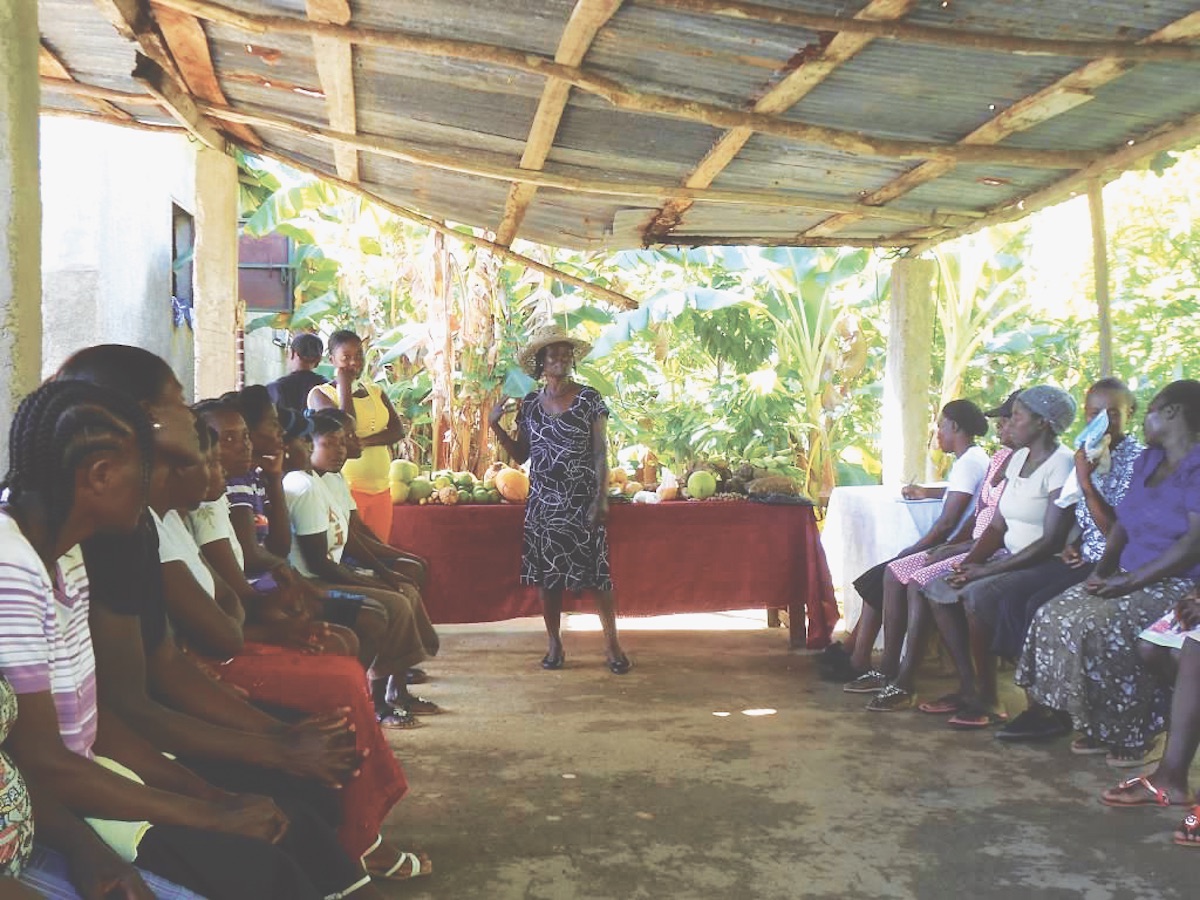Promoting Community Health Through Skits and Song in Haiti’s Mothers’ Clubs

Earlier this year, the Tibouk Club met on the veranda of their local co-op, the women sitting on narrow benches – and dressed for company! – with a row of chairs for the visitors next to a head table laid out with fruits and vegetables from the women’s gardens — bananas, plantains, sugarcane, papayas, okra, greens….
The meeting opens with a welcome song from the women, before the group’s leader explains that the women are going to demonstrate through skits and song the lessons they learned through months of training and workshops.
A chair defines the center of the room as the stage, and women quickly add elements of their costumes – scarves, pillows and the like — and the show begins.
A pregnant woman hobbles in leaning on a staff as she walks to market, her hand rubbing the small of her back … she moans in pain. She meets a friend on the path and laments that this, her 7th pregnancy, is “killing her”… her feet are swollen, her breath is halting, her head hurts and her pulse is rapid. Her friend challenges her folk beliefs that swollen ankles are a sign that one is carrying twins and instead are symptoms of pre-eclampsia. Through the dialogue, the skit explores the symptoms and dangers of pre-eclampsia, the importance of attending a pre-natal clinic and the need to cut salt and coffee — very difficult, as Haitians love salty foods, and coffee is an important part of daily rituals. The audience is quite engaged, and the women encourage the actors.
The other skits follow a similar pattern — an issue relevant to the group is introduced, the issue is examined, solutions are analyzed, strategies to deal with the problem are introduced and demonstrated with the goal of changing behaviors.
During the morning, we watched a breastfeeding demonstration and learned why certain traditional practices such as discarding colostrum and introducing solid foods too early are harmful. Another skit explores the benefits of good nutrition: what constitutes a healthy diet, and how to eat well using local foods, diversifying kitchen garden crops and avoiding unhealthy foods such as baby formula and sugary drinks; safe birthing, family planning and violence prevention were also discussed.
Each skit concluded with a song that summarizes the takeaway points of the role play and encouraged women to seek health care and to use treated water and proper sanitation. The women create the skits and compose the songs to express what they learn in the course of their training. While all the skits challenge harmful folk beliefs and traditional practices, they also stress that the women are strong and already do a fantastic job, but can make things better by applying these lessons to their lives.
The visitors were invited to ask questions that the women were only too eager to answer. It is through these discussions that the objectives of the Mothers’ Clubs emerged:
– to increase the ability of women to solve problems
– to help them make informed choices for themselves and their families
– to boost women’s self-confidence by encouraging them to become agents of change.
The women we met in Tibouk get it! They could explain why they had joined the group, and they were clear about what they expected from Mothers’ Clubs for themselves and for their families. They shared their stories openly and without guile.
One woman said that she was proud when women stopped her on her way home from a meeting to ask her to share what she had learned that day; she added that she wanted to make a difference by becoming a leader in her community and by teaching other women. Another woman laughed when she told us how at first, her husband would complain that instead of working in her garden or taking care of her children, she wasted her time hanging out with a bunch of women. She ignored him and never missed a meeting. She applied what she learned: she treated the water the family uses, insisted on proper disposal of waste, taught her children to wash their hands, cooked more balanced meals and planted nutritious foods. She noticed that her children were healthier, and she was stronger. Her husband changed his tune when he realized that they were spending less on medication and saving money by growing their own food. On Thursday nights he now reminds her that her Club is meeting.

